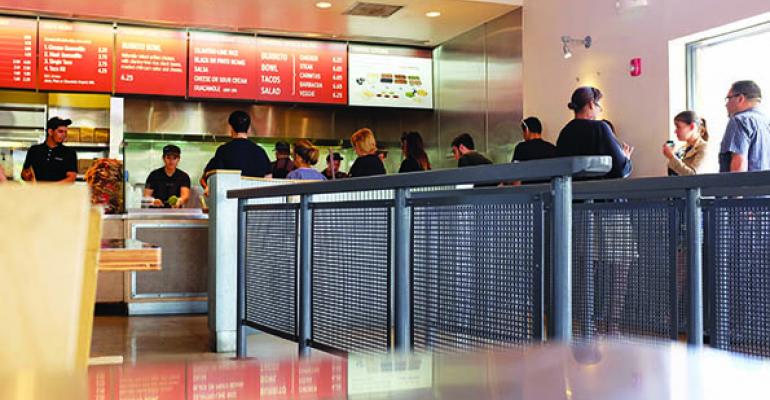The Centers for Disease Control and Prevention defended its right to alert the public about foodborne illness at Chipotle Mexican Grill restaurants last year in an exchange of letters made public last week.
In a letter dated April 15 to Chipotle officials, Dr. Jeremy Sobel, the CDC’s associate director for epidemiological sciences, said the public health agency followed specific guidelines and procedures in attempting to “protect and inform the public” about the initial E. coli outbreak over several months that ultimately sickened 55 people in 11 states, including 21 who were hospitalized, though there were no reported deaths.
A second E. coli outbreak sickened another five people in three states, and the chain also suffered reports of Norovirus and Salmonella in separate cases last year. The crisis sent same-store sales and traffic plummeting and Chipotle officials face a federal criminal investigation into its food-safety practices.
[CHARTBEAT:3]
For its March 31-ended first quarter, same-store sales were down nearly 30 percent and Chipotle reported its first quarterly loss as a public company, though sales have since been improving and officials expect the fast-casual chain to recover over time.
The exchange between Chipotle and the CDC was made public by Food Safety News. Publisher of the site is foodborne illness attorney Bill Marler, who is involved in multiple lawsuits against Chipotle filed by victims of the outbreaks.
Sobel’s comments were in response to a letter from Chipotle’s attorneys in December expressing concern that the CDC had failed to follow its own regulations and federal law in routinely updating the public about the investigation of E. coli 026 at restaurants across the country.
At issue were the CDC’s routine web updates. Chipotle attorneys argued the updates didn’t include information clearly and concisely, and that they “unnecessarily intensified the public’s concern.”
The letter cited the CDC’s inclusion of E. coli cases in Pennsylvania and Maryland, for example, which at the time had no known connection to Chipotle restaurants, the December letter said.
Chipotle also argued that CDC officials made “misleading and unnecessary” comments to the media, who speculated the source of the E. coli outbreak was not meat because vegetarians were among those who fell ill.
In response, Sobel dismissed the concerns, saying the CDC was reporting on cases involving those sickened by an E. coli strain with a specific footprint tied to Chipotle, including cases in which patients had no known contact with a restaurant. People don’t always recall having eaten at a Chipotle when such illnesses are reported to the CDC, and some may have fallen ill from secondary contact with someone else who had eaten at a restaurant, the letter said.
Sobel also defended the CDC representative quoted in news stories, saying the comments were an accurate characterization of the investigation at the time.
The CDC noted that Chipotle had the right to further dispute the issue, but a spokesman for the Denver-based chain said there were no plans to appeal the resolution, according to Bloomberg News.
Officials were never able to pinpoint the exact source of either E. coli outbreak.
Chipotle, meanwhile, has launched strict new food-safety protocols designed to prevent further issues with foodborne illness. Over the past few months, the chain has also been inviting guests back with offers of free burritos and discount coupons.
Correction: May 10, 2016 This story was updated clarify the source of the letter exchange.
Contact Lisa Jennings at [email protected]
Follow her on Twitter: @livetodineout

